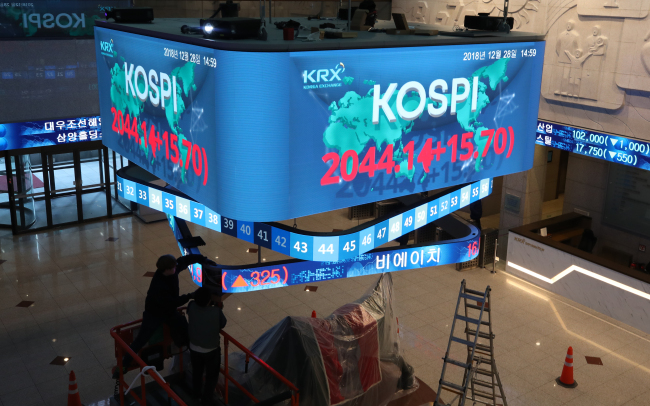S. Korean stock market falls by sharpest margin in decade: data
By YonhapPublished : Dec. 28, 2018 - 18:28
South Korea‘s major stock indices recorded the sharpest fall in a decade this year, data showed Friday, amid global uncertainties and slowing domestic demand.
The benchmark Korea Composite Stock Price Index (KOSPI) closed at 2,041.04 in the final trading session of the year on Friday, down 17.28 percent, or 426.45 points, from the end of last year, according to the bourse operator, Korea Exchange.

This is the biggest drop since 2008 when the index nosedived 40.7 percent due to the global economic crisis. It is also the first time in four years that the KOSPI logged negative growth, the KRX said.
Last year, the key index surged 441.03 points, or 21.8 percent. The total market capitalization in 2018 also shrank 16.3 percent on-year to 1,344 trillion won (US$1.204 trillion) due mainly to losses in blue chips such as tech giant Samsung Electronics Co., according to the bourse operator.
But the average daily turnover grew 17.1 percent, and the trading volume surged 22.9 percent, which means there was greater volatility on the market this year, the KRX said, noting the data as of 3:30 p.m.
The yearly high was logged on Jan. 29 when the index spiked to 2,598.19, while the lowest figure was 1,996.05 on Oct. 29.
Foreign investors turned to a net selling mode for the first time in three years in 2018 by unloading a net 5.7 trillion won worth of local shares. They accounted for 35.6 percent of shares on the main bourse as of the end of this year, down from the previous year’s 37.2 percent, the KRX said.
Institutions were also net sellers by shedding a net 2.9 trillion won, though retail investors picked up a net 7 trillion won in 2018.
The tech-laden secondary KOSDAQ also fared ill by tumbling 15.37 percent, or 122.77 points, on-year to end at 675.65, which is also the largest fall since 2008 when the index plunged 52.8 percent.
The total market cap declined 19.3 percent this year to 228.2 trillion won, while the daily trading volume and turnover went up 7.9 percent and 33.5 percent, respectively, according to the KRX.
The poor performances this year were attributable to unfavorable developments both at home and abroad, experts said, citing trade frictions between the United States and China, U.S. belt-tightening, signs of economic slowdowns in emerging nations, and grim prospects for the semiconductor industry, among others.
“What is worrisome is that issues that have affected the market in 2018 remain unresolved,” Yoo Seung-min, an expert at Samsung Securities Co., said.
Noting that major firms‘ earnings forecasts for next year have been slashed, the analyst said things, “could get worse if global trade contracts further in the new year.” (Yonhap)








![[Graphic News] More Koreans say they plan long-distance trips this year](http://res.heraldm.com/phpwas/restmb_idxmake.php?idx=644&simg=/content/image/2024/04/17/20240417050828_0.gif&u=)
![[KH Explains] Hyundai's full hybrid edge to pay off amid slow transition to pure EVs](http://res.heraldm.com/phpwas/restmb_idxmake.php?idx=644&simg=/content/image/2024/04/18/20240418050645_0.jpg&u=20240419100350)








![[KH Explains] Hyundai's full hybrid edge to pay off amid slow transition to pure EVs](http://res.heraldm.com/phpwas/restmb_idxmake.php?idx=652&simg=/content/image/2024/04/18/20240418050645_0.jpg&u=20240419100350)

![[Today’s K-pop] Illit drops debut single remix](http://res.heraldm.com/phpwas/restmb_idxmake.php?idx=642&simg=/content/image/2024/04/19/20240419050612_0.jpg&u=)